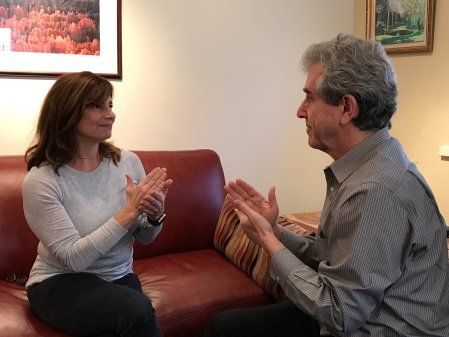3 Ways Mentioning Energy Psychology Research Can Help You – And Your Clients!
(by Sarah Murphy, LPC) I like to throw in a teeny bit of “well, the research says …” when I introduce my clients to energy psychology. I find it helps clients believe what I’m talking about, feel comfortable doing what I’m asking them to do, and trust that I know what I’m doing.
I am a bit of a research geek. Every month when I write my research blogs for ACEP, I have to go back and review what the research says.
It forces me to take a deeper dive than I have since I was in graduate school. I like the dive.
However, just a snorkel can give us enough information to use when we talk to our clients about the research on energy psychology. A sentence or two can make a big difference when we are introducing our clients to energy psychology protocols.

Here’s how having a few research talking points can:
Lower the barrier to entry and take the “woo-woo” out of energy psychology.
I don’t even need to say it, do I? Most Western mental health and health practitioners are still holding to the Western paradigm ― which is just a paradigm, not a cornerstone on truth. However, many people accept it as truth.
The drumbeat in Western mental health (and medicine in general) is a very materialistic one. The mind and the brain are the same; memories are stored in “file drawers” in the brain; mental health problems are the result of brain chemistry imbalances. When we talk about tapping on meridian points to address emotional issues, we are speaking outside the dominant paradigm and we can come off sounding a bit woo-woo.
Energy psychology relies on a non-Western paradigm, but it is not woo-woo. It is an evidence-based set of therapies. In fact, energy psychology therapies are among the top 10 most-researched forms of therapy (in a crowded field of more than 400 therapeutic techniques). Being able to state that makes energy psychology more palatable to the Western palate and takes these methods out of the world of woo-woo and places them in the cutting-edge, evidence-based treatment room where they belong.
Enroll your clients into following the protocols.
When we ask our clients to tell the story or feel the feelings while tapping on body parts, they might feel a little silly. This is certainly not a mainstream activity ― yet! We can help them feel more comfortable with it when we are able to let them know that more than 115 studies have been published in quality journals, and more than 99% show that doing this silly-seeming activity really is effective.
Moreover, when our clients are dealing with depression or anxiety or PTSD, and we tell them that a meta-analysis shows that doing energy psychology will help with depression or anxiety or PTSD, it helps them feel less silly and more ― well, smart for doing it.
Position yourself as an expert ― a smart one whom they can trust.
Being able to cite research, even briefly, lends us credibility. I find that all of my clients straighten up a little bit when I cite research. It shows them that I’m not just partisan, and I’m not just a nice person who makes them feel better. I know my stuff.
The difference can affect therapeutic rapport and boost the therapeutic alliance. Clients understand that there is a science as well as an art to all this, and ― even if they never get into the weeds about the science ― it helps them to know that the science is there.
Here’s a snorkel you can use right now.
- 200+ articles published in peer-reviewed journals, including
- 115 studies; of those,
- 99% document efficacy for energy psychology, including
- 12 systematic reviews and
- 5 meta-analyses
Want a deeper dive?
Check out these recent studies on the physiological response to energy psychology (in this case, Emotional Freedom Techniques)
- fMRI(functional magnetic resonance imaging) study found that EFT facilitated structural changes in the limbic system and a decrease in food cravings corresponding to the brain changes.
- Micro RNA was downregulated following EFT. Micro RNA plays a role in gene expression and may be factors in depression.
- EFT changed a host of physiological markers salivary immunoglobulin-A (related to immune function), cortisol, resting heart rate, and blood pressure.
When you have just a few of these stats or studies on the tip of your tongue, you might find your clients trust energy psychology (and even you) a little more than before.
I’ll be writing about a cool new study comparing Thought Field Therapy and Cognitive Behavioral Therapy next month, so stay tuned!
In addition, ACEP will be sharing a FREE master class on “How to Tell a Great Energy Healing Science Story” next week – October 13-19, 2020. You don’t want to miss it. And if you’ve seen it before, it’s well worth another look. Go here to sign up.
Author
Sarah Murphy, LPC, is a licensed professional counselor and coach with more than 12 years of clinical experience. She is a member of the Association for Comprehensive Energy Psychology. Sarah specializes in energy psychology, including EFT, as well as mindfulness and hypnotherapy. In her therapy practice, Transformative Therapy, she works with individuals seeking to find peace within themselves, people who have serious medical diagnoses, and couples who want to resolve conflict and live in harmony. Sarah’s personal motto is that we are here to create a more peaceful world, one more-peaceful person at a time. Sarah’s therapeutic approach brings an Eastern influence to Western psychological modalities. Learn more at www.transformative-therapy.com.



